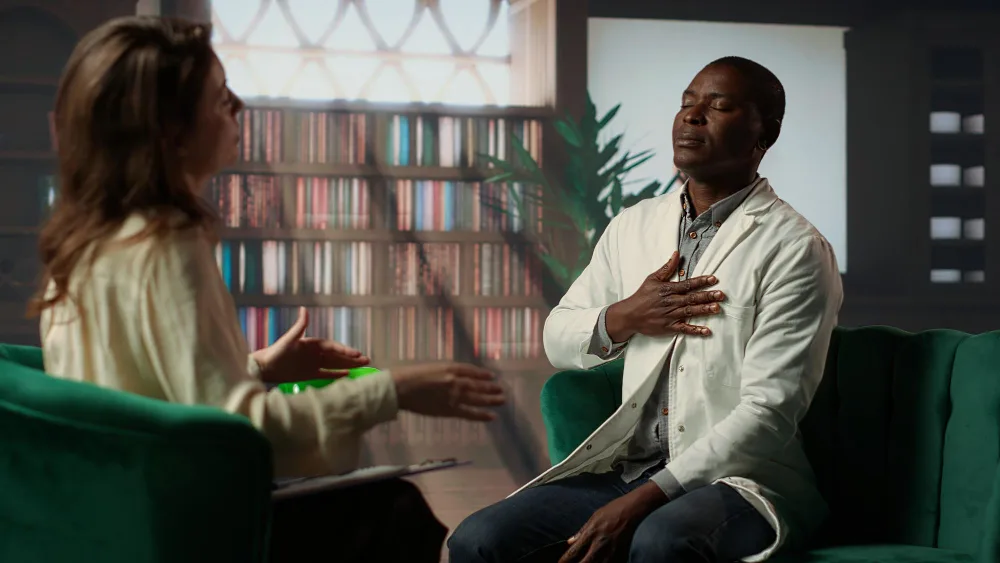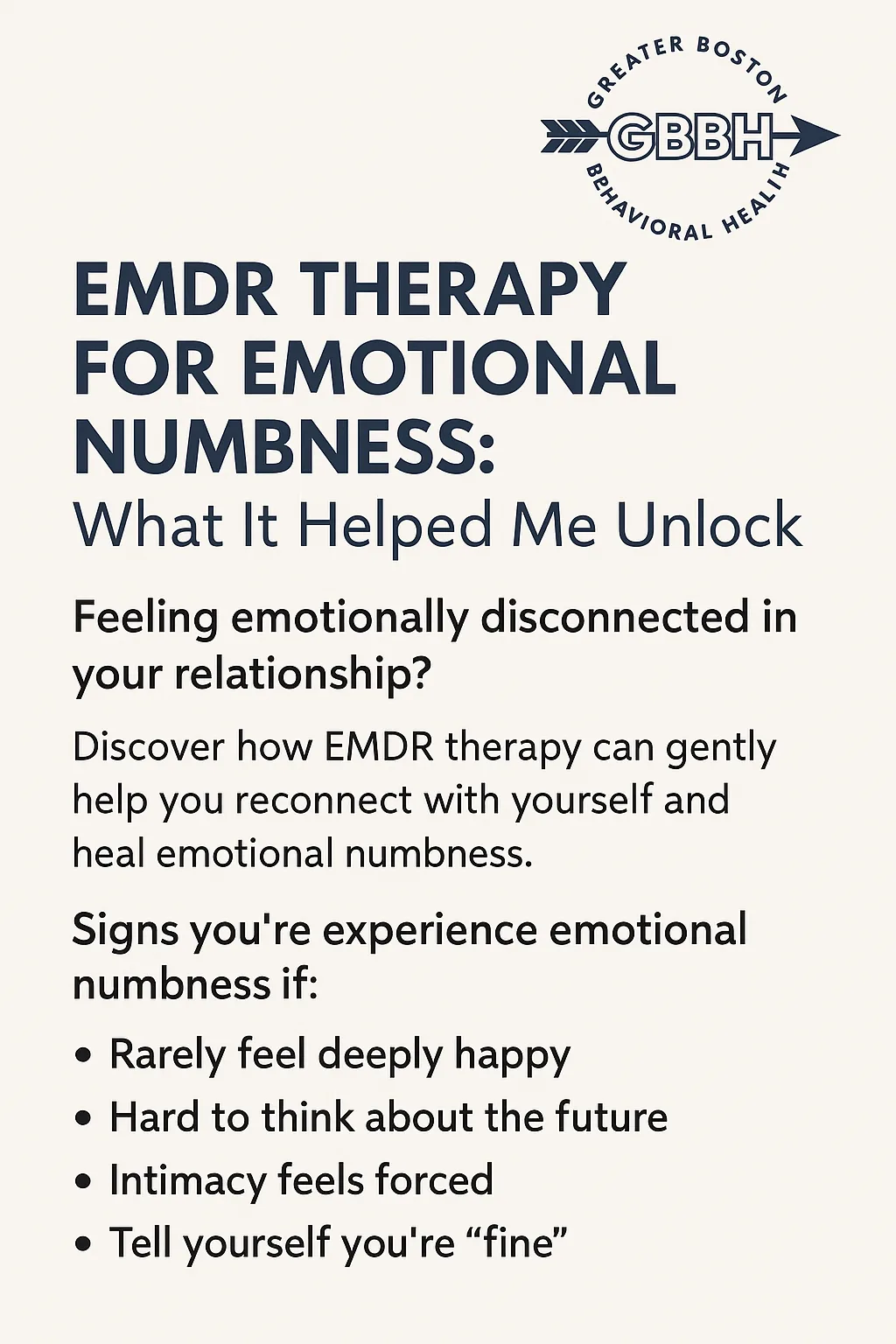Being in love isn’t supposed to feel like going through the motions. Yet for many partners and spouses of someone struggling with addiction, it quietly turns into just that—surviving the day, keeping the peace, and slowly losing connection to yourself.
Emotional numbness doesn’t always arrive with a bang. It sneaks in during the late nights, the arguments that feel too exhausting to have, the quiet acceptance of feeling flat instead of fulfilled.
As a clinician, I’ve seen this so often. Partners who once described themselves as passionate, fun, caring—now feel like they’re sleepwalking through their own life. EMDR therapy is one approach that has gently opened the door for them to feel alive again.
What Is EMDR Therapy—and Why It Helps With More Than Just Trauma
Eye Movement Desensitization and Reprocessing (EMDR) therapy was developed to help people process trauma. But over the years, it’s become clear: EMDR is just as effective for those experiencing emotional shutdown—even if they wouldn’t call their experiences “trauma.”
Here’s why it works.
EMDR therapy taps into the brain’s natural ability to process stuck emotions. Using bilateral stimulation (such as side-to-side eye movements or tapping), EMDR helps “unstick” memories, emotions, and reactions that feel frozen in your nervous system.
This isn’t about talking through every hard moment in painful detail. It’s about letting your brain do the work it’s designed to do: process, release, and heal. For many people in relationships where emotional numbness has set in, EMDR therapy offers the first safe space to start feeling again—without being overwhelmed.
At Greater Boston Behavioral Health’s EMDR therapy program, we’ve helped many partners reconnect with themselves after years of emotional survival mode.
Signs You May Be Experiencing Emotional Numbness
Emotional numbness is easy to miss because it often feels like you’re “managing well.” You might still function at work, care for the kids, and show up for obligations—but inside, there’s a blankness where joy, anger, or even sadness used to live.
You might be experiencing emotional numbness if:
- You rarely feel deeply happy—even in moments that used to bring you joy.
- You avoid thinking about the future because it feels like too much.
- You’re more irritable but also more detached.
- It’s hard to cry, even when things are genuinely painful.
- Intimacy feels forced, or you simply “go through the motions.”
- You tell yourself you’re “fine” but feel empty inside.
Emotional numbness isn’t just a response to trauma—it’s often a natural defense when life feels emotionally unsafe. EMDR therapy can help you gently lower those walls, one layer at a time.
What to Expect in EMDR Therapy
Many people are nervous before starting EMDR therapy, especially if they feel emotionally shut down. You might wonder: What if I don’t feel anything? What if it doesn’t work for me?
The good news? EMDR meets you where you are. You don’t have to be “ready” to feel—you just have to show up. Here’s what the process generally looks like at Greater Boston Behavioral Health:
- Assessment and Preparation: Your therapist will first help you identify key experiences, emotions, or thought patterns that feel stuck. This could include moments of intense stress, relationship conflict, or childhood dynamics—not just “big T” trauma.
- Resource Building: Before any processing happens, you’ll learn grounding techniques to help you stay safe and steady during sessions.
- Bilateral Stimulation: Using guided eye movements or tapping, your therapist helps activate your brain’s natural processing pathways while you revisit key memories or emotions.
- Processing and Integration: Many people notice spontaneous shifts—tears where there were none, lightness where there was tension, insights that felt unreachable before.
Over time, EMDR helps you reclaim your natural emotional range. You may find that you laugh more easily, cry when it’s appropriate, and finally reconnect to parts of yourself that felt lost.
How EMDR Helped Me Feel Like Myself Again
I’ve had clients describe the experience in beautiful ways:
“It felt like turning the lights back on in a house I forgot I lived in.”
“I didn’t even realize how much I’d shut down until I felt my first real laugh again.”
If you’ve been carrying the invisible weight of loving someone in active addiction, EMDR therapy can be the place where your feelings finally have space. You don’t have to pretend to be fine anymore.
If you’re looking for EMDR therapy in Newton, MA or surrounding areas like Needham and West Roxbury, Greater Boston Behavioral Health offers compassionate, structured care close to home.
EMDR Doesn’t Just Help You Cope—It Helps You Reconnect
This is more than a coping strategy. EMDR therapy helps rebuild your internal world—your sense of joy, safety, and inner voice. While your partner may be in active addiction or recovery, you also deserve care. You deserve to feel whole, even if life around you remains complicated.
At Greater Boston Behavioral Health, we provide EMDR therapy tailored to your unique story. And for those in Needham, Newton, or West Roxbury, we have nearby locations to make care accessible.
Frequently Asked Questions About EMDR Therapy
Is EMDR only for people with trauma?
No—while EMDR is well-known for trauma work, it’s equally helpful for emotional numbness, anxiety, self-esteem issues, and relationship struggles. Many partners of individuals with addiction benefit from EMDR to reconnect with their emotions after long-term emotional exhaustion.
Do I have to talk about everything that’s happened?
Not at all. EMDR does not require you to talk through every detail of painful memories. The focus is on allowing your brain to process and heal in a way that feels manageable and safe.
How many EMDR sessions will I need?
This varies by individual. Some people notice changes in 6–8 sessions, while others continue longer to address multiple layers of emotional blocks. Your therapist will help guide the process based on your needs.
Can EMDR help if my partner hasn’t changed?
Yes. EMDR focuses on your emotional well-being. Whether your partner is in recovery or still using, you deserve to reconnect with yourself and experience relief from emotional numbness.
Is EMDR available near me in Boston?
Absolutely. We offer EMDR therapy in Boston, MA, and nearby areas including Needham, Newton, and West Roxbury.
Ready to Feel Like Yourself Again?
You deserve more than just surviving—you deserve to feel again. EMDR therapy offers a safe, structured way to reconnect with your emotions, your joy, and your sense of self.
Call tel:888.450.3097 or visit to learn more about our EMDR therapy services in Boston, Massachusetts.


